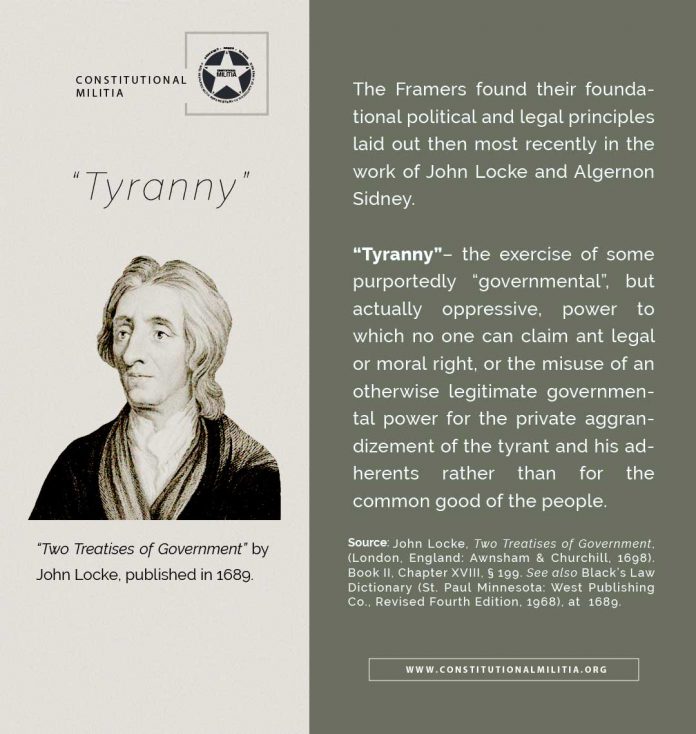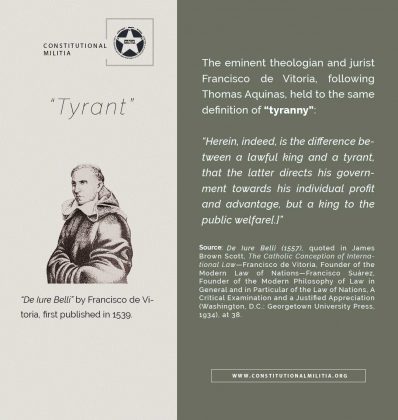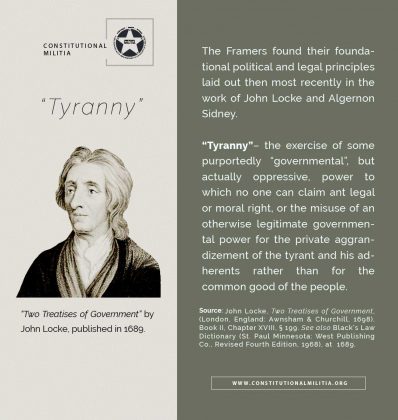Last Updated on July 11, 2022 by Constitutional Militia
“Usurpation”
“Usurpation” – the exercise of some otherwise legitimate governmental power as to which the particular actor actor enjoys no legal claim.
Source: John Locke, Two Treatises of Government, (London, England: Awnsham & Churchill, 1698. Book II, Chapters XVII-XVII, §§ 197-199. See also Black’s Law Dictionary (St. Paul Minnesota: West Publising Co., Revised Fourth Edition, 1968), at 1713.
“Tyranny”
“Tyranny” – the exercise of some purportedly “governmental”, but actually oppressive, power to which no one can claim ant legal or moral right, or the misuse of an otherwise legitimate governmental power for the private aggrandizement of the tyrant and his adherents rather than for the common good of the people.
Source: John Locke, Two Treatises of Government, (London, England: Awnsham & Churchill, 1698. Book II, Chapters XVII, § 199. See also Black’s Law Dictionary (St. Paul Minnesota: West Publishing Co., Revised Fourth Edition, 1968), at 1689.
“Usurpation” and “Tyranny”: Actions by Government Officials that are not governmental, but criminal
The political philosophy upon which the Declaration of Independence relied was then part of “the Laws of Nature and of Nature’s God” to which “the opinions of mankind” throughout Western civilization had long deferred. Otherwise, how could those “Laws” have “entitle[d]” Americans to a “separate and equal station” “among the powers of the earth” in the view of “a candid world” to which the Declaration submitted its evidence and arguments? Self evidently the Founders did not claim to have invented these “Laws” themselves, only to have applied them to the Colonies’ situation. Rather, the Framers found their foundational political and legal principles laid out then most recently in the work of John Locke[1] and Algernon Sidney,[2] whom Thomas Jefferson ranked as the two well-springs from which Americans drew their political inspirations with respect to liberty and men’s unalienable rights.[3]
In keeping with the necessity to interpret constitutional terms according to the meanings they had during the pre-constitutional era, “usurpation” and “tyranny”—which are paradigmatic categories of unconstitutional actions—should be defined. According to Locke, “Usurpation is the exercise of Power, which another hath a Right to”.[4] According to Sidney, three forms of usurpation were the most common:
• The first is, when one or more men take upon them the power and name of a magistracy, to which they are not justly called.
• The second, when one or more being justly called, continue in their magistracy longer than the laws by which they are called do prescribe.
• And the third, when he or they who are rightly called, do assume a power, tho within the time prescribed, and that the law does not give; or turn that which the law does give, to an end different and contrary to that which is intended by it.[5]
To Locke,
Tyranny is the exercise of Power beyond Right, which no Body can have a Right to. And this is making use of the Power that any one has in his hands; not for the good of those, who are under it, but for his own private separate Advantage. When the Governour, however intituled, makes not the Law, but his Will, the Rule; and his Commands and Actions are not directed to the preservation of the Properties of his People, but the satisfaction of his own Ambition, Revenge, Covetousness, or any other irregular Passion.
* * * * *
’Tis a Mistake to think this Fault is proper only to Monarchies;
other Forms of Government are liable to it, as well as that. For where-ever the Power that is put in any hands for the Government of the People, and the Preservation of their Properties, is applied to other ends, and made use of to impoverish, harass, or subdue them to the Arbitrary and Irregular Commands of those that have it: There it presently becomes Tyranny, whether those that thus use it are one or many.[6]
To which Sidney agreed,
that regard is to be had to the principal end and cause, for which a * * * lord is set over [a people] which is their good and profit, and not that it should turn to their destruction and ruin; for if that should be, there is no doubt but from thence forward, that power would be tyrannical and unjust, as tending more to the interest and profit of that lord, than to the publick good and profit of the subjects; which, according to natural reason, and the laws of God and man, is abhorred, and deserves to be abhorred.[7]
This definition of “tyranny”, of course, was not original with either Locke or Sidney. Much earlier Thomas Aquinas had opined that “[a] tyrannical régime is not just, because it is not directed to the common good but to the private good of the one who rules”.[8] For another example, the eminent theologian and jurist Francisco de Vitoria, following Aquinas, held to the same definition: “Herein, indeed, is the difference between a lawful king and a tyrant, that the latter directs his government towards his individual profit and advantage, but a king to the public welfare[.]”[9]
As Justice Joseph Story pointed out in a passage that cannot be repeated to often, “The militia is the natural defence of a free country against *** domestic usurpation of power by rulers. *** The right of the citizens to keep and bear arms has justly been considered as the palladium of the liberties of the republic, since it offers a strong moral check against the usurpation and arbitrary power of rulers, and will generally, even if these are successful in the first instance, enable the people to resist and triumph over them.”[10]


































